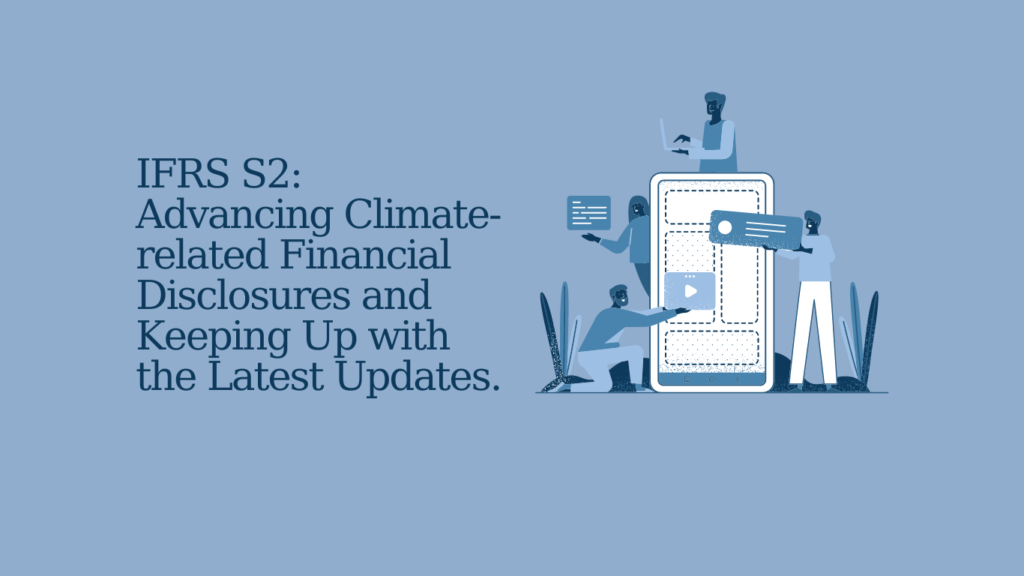
The increasing recognition of climate change as a significant global challenge has prompted a greater focus on the financial implications of climate-related risks and opportunities. In response to this growing demand for transparent and consistent reporting, the International Sustainability Standards Board (ISSB) has undertaken the development of IFRS S2, an integral part of the International Financial Reporting Standards (IFRS) project on sustainability-related disclosures. This article delves into the key aspects and implications of IFRS S2 and its role in advancing climate-related financial disclosures.
Understanding IFRS S2:
IFRS S2, titled „Climate-related Financial Disclosures,“ aims to establish a comprehensive framework for organizations to disclose information related to climate change and its impact on their financial performance. The standard provides guidance on reporting climate-related risks and opportunities, enabling stakeholders to assess the financial implications of climate-related factors on an organization’s activities.
The International Sustainability Standards Board (ISSB) is in the final stages of developing requirements for entities to disclose information about their climate-related risks and opportunities. The ISSB published the Exposure Draft IFRS S2 Climate-related Disclosures in March 2022, which builds upon the recommendations of the Task Force on Climate-Related Financial Disclosures (TCFD) and incorporates industry-based disclosure requirements from SASB Standards. After considering feedback on the Exposure Draft, the ISSB expects to issue an IFRS Sustainability Disclosure Standard by the end of the second quarter of 2023.
During an update in February 2023, the ISSB made several key decisions. Firstly, they decided to allow preparers to consider the most recent pronouncements of other standard-setting bodies in identifying sustainability-related risks and opportunities, but this consideration is not mandatory. Additionally, the ISSB introduced a requirement to permit the consideration of the Global Reporting Initiative Standards and the European Sustainability Reporting Standards for disclosure of sustainability-related risks and opportunities. The effective date for both IFRS S1 and IFRS S2 was confirmed to be annual reporting periods beginning on or after January 1, 2024, with early application being permitted. The ISSB also provided transitional relief for entities reporting sustainability-related financial disclosures and decided not to re-expose IFRS S1 and IFRS S2. All decisions were agreed upon by the 14 members of the ISSB.
Alignment with the TCFD Framework:
IFRS S2 aligns closely with the recommendations of the Task Force on Climate-related Financial Disclosures (TCFD), a global initiative established by the Financial Stability Board (FSB). The TCFD framework provides a widely recognized and industry-supported framework for reporting on climate-related risks and opportunities. By incorporating the TCFD recommendations, IFRS S2 ensures consistency, comparability, and reliability in climate-related financial disclosures, enhancing transparency and facilitating informed decision-making.
Key Components of IFRS S2:
- Disclosure of Climate-related Risks and Opportunities: IFRS S2 emphasizes the disclosure of material climate-related risks and opportunities that have a significant impact on an organization’s financial position, performance, and prospects. This includes risks associated with physical impacts of climate change, transition risks related to the shift towards a low-carbon economy, and opportunities arising from climate-related initiatives and innovations.
- Integration with Financial Statements: IFRS S2 emphasizes the integration of climate-related information with an organization’s financial statements. This integration ensures that climate-related risks and opportunities are reported in a manner that enables stakeholders to understand their financial implications and make informed investment decisions.
- Scenario Analysis and Sensitivity Testing: The standard encourages organizations to conduct scenario analysis and sensitivity testing to assess the potential impact of different climate-related scenarios on their financial position. This helps organizations evaluate the resilience of their business models and financial strategies in the face of climate-related risks.
- Governance and Strategy Disclosures: IFRS S2 requires organizations to disclose information about their governance structures, including the roles and responsibilities of the board and management in overseeing climate-related risks and opportunities. It also emphasizes the disclosure of an organization’s strategy for managing and mitigating climate-related risks, highlighting the proactive measures taken to address climate change.
Implications and Benefits:
IFRS S2 has significant implications for organizations and stakeholders alike. By mandating climate-related financial disclosures, the standard enhances transparency and accountability, enabling investors and other stakeholders to assess an organization’s exposure to climate-related risks and the effectiveness of its climate-related strategies. This, in turn, facilitates the allocation of capital towards more sustainable and resilient businesses. Moreover, IFRS S2 encourages organizations to integrate climate-related considerations into their decision-making processes, promoting long-term sustainability and resilience.
Challenges and Implementation:
Implementing IFRS S2 poses challenges for organizations, including the need for robust data collection and management systems, as well as the development of appropriate methodologies for scenario analysis and sensitivity testing. Organizations will also need to build internal capacity and expertise to effectively navigate the complexities of climate-related financial disclosures.
In conclusion, IFRS S2 (Climate-related Financial Disclosures) represents a crucial milestone in advancing transparency and accountability in the realm of climate-related reporting. With its alignment to the Task Force on Climate-related Financial Disclosures (TCFD) framework and emphasis on integrating climate-related information with financial statements, IFRS S2 provides a comprehensive framework for organizations to disclose climate-related risks and opportunities.
The implementation of IFRS S2 brings forth numerous benefits, including enhanced transparency for investors and stakeholders, informed decision-making, and the allocation of capital towards sustainable and resilient businesses. By mandating the disclosure of material climate-related information, organizations are empowered to assess their exposure to climate risks, strengthen their climate strategies, and ultimately contribute to a more sustainable future.
However, the implementation of IFRS S2 is not without its challenges. Robust data collection, reliable methodologies for scenario analysis, and the development of internal capacity are among the hurdles that organizations may encounter. Nevertheless, overcoming these challenges is vital to ensure the effective implementation of the standard and to harness its full potential in driving sustainable practices and resilient business models.
As the global focus on climate change intensifies, IFRS S2 serves as a catalyst for organizations to integrate climate-related considerations into their decision-making processes. By acknowledging and addressing climate-related risks and opportunities, organizations can proactively navigate the complexities of the evolving business landscape, foster long-term sustainability, and contribute to building a more resilient global economy.
In conclusion, IFRS S2 stands as a significant step towards comprehensive climate-related financial disclosures, playing a pivotal role in promoting transparency, accountability, and sustainable practices across industries. It represents a shared commitment towards a more sustainable future and underscores the importance of climate considerations in financial reporting.
Sources:
https://www.ifrs.org/projects/work-plan/climate-related-disclosures/
